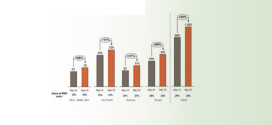
Abu Dhabi’s foreign trade was worth aed 109.1bn in 2010, a decrease of 2.5 per cent compared to 2009, according to the Emirate’s department of Finance, General directorate of Customs, in providing annual statistics on foreign goods arriving via land, sea and air.
The statistics also showed a decline in imports, recording aed 86.54bn, a drop of 7.8 per cent compared to aed 93.8bn in 2009. re-exports reached aed 10.9bn, up 26.4 per cent compared to aed 8.6bn in 2009. non-oil exports grew to aed 11.61bn compared to aed 9.5bn in 2009, an increase of 22.2 per cent.
Saeed Ahmed Abdullah Al Muhairi, director general of General Directorate of Customs in Abu Dhabi, said, “The statistical data for 2010 shows continued growth in the nonoil exports and re-exports compared to 2009, with a minor decline in imports. These figures reflect the overall improvement in Abu Dhabi’s trade balance over the past year.”
He added, “The figures also reflect the growth of non-oil export competitiveness of UAE products in global markets as well as the soundness of our economic policies. We continuously strive to facilitate foreign trade and reinforce growth in the volume of exports, fuelling the economic activities in the country. as a result, we expect further positive results in terms of foreign trade during 2011.”
Other points in the annual statistics were the fact that Brazil is Abu Dhabi’s top trading partner for non-oil exports, followed by Norway and Saudi Arabia; exports to Oman increased by 110 per cent; and the US was Abu Dhabi’s top trading partner in terms of imports, followed by Saudi Arabia and Japan. also, imports from Turkey rose by 49 per cent between 2009 and 2010.
In terms of re-exports, Bahrain ranked first, followed by Qatar and Saudi Arabia. however, re-exports to Pakistan grew the most, with an increase of 373 per cent.
 Cash And Trade Magazine For Cash and Trade professionals in the Middle East
Cash And Trade Magazine For Cash and Trade professionals in the Middle East




